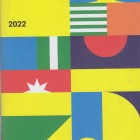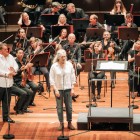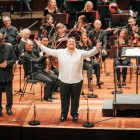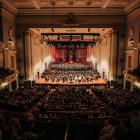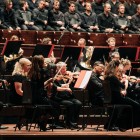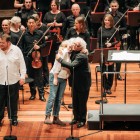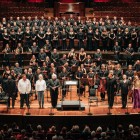Fidelio 2022Edinburgh International Festival
Read more about the opera Fidelio
It seems astonishing that it is a decade since Fidelio was last heard in Scotland. That staging, at the 2012 Festival, was not universally admired, and the previous excellent performance was also in concert form (conducted by Sir Charles Mackerras). It is a notoriously difficult work to bring off.
Edinburgh-born Sir Donald Runnicles has a superb record in presenting great works at the Festival in concert form. How sad that he has not yet been able to present a fully-staged opera. However he is extremely busy with his multiple commitments around the world, so we must be grateful that he still finds space in his diary for a regular visit.
The Philharmonia has not been heard in Scotland for some years, and this central work of the Germanic operatic repertoire suited them beautifully. Their five-day residency began with the Philharmonia Chamber Players opening the Queen's Hall morning recital series on Saturday 6 August. That evening saw the first of three performances of Rusalka at the Festival Theatre. The first of two events at the Usher Hall was a Beethoven and Shostakovich concert under the orchestra's new Principal Conductor Santtu-Matias Rouvali on the Sunday. The orchestra's fifth evening was devoted to this concert performance of Fidelio.
The chorus, Philharmonia Voices, was a large group of professionals - quite a few familiar names among them. The two prisoners were excellent soloists drawn from the ranks of men in the first act. A much larger group rushed on for the start of the finale.
The combination of conductor, orchestra and chorus made an electrifying effect. The third of Beethoven's overtures, Leonora no3, is widely considered to be too dramatic, representing the opera in microcosm. The fourth attempt, the Fidelio overture, usually seems pale by comparison. Not on this occasion. The evening began with dramatic, stabbing chords, and the overture proceeded in a highly dramatic form. The opening sequence with Marzelline and Jacquino also seemed far more involved than is sometimes the case. Some performances only seem to get going with the wonderful canon quartet. On this occasion everything was already taut and controlled. It stayed that way right to the end. The closing scene was superbly dramatic, with the chorus sequences taken at breakneck speed. It was all completely memorable.
Sir Willard White, is, of course, a familiar figure, and just the right strong presence required to bring about the satisfactory ending. His exalted career has spanned nearly half a century and the voice showed no sign of a diminution in its effectiveness. There was a sense of surprise at the start when he walked on with the conductor and sat down. The programme had announced that there would be a narration to replace the dialogue. This was an adaptation by Sir David Pountney, no less, and presented Don Fernando as a framing device, reminiscing about the 'Truth and Reconciliation Commission' that had enquired into Don Pizarro's activities. His rich speaking tones reminded us that back in 1989 he had enjoyed a great success as Shakespeare's Othello with the RSC at Stratford, directed by Trevor Nunn, with Ian McKellen and Imogen Stubbs as Iago and Desdemona.
The originally announced Leonore, Jennifer Davis, highly praised as Elsa at Covent Garden, was unwell. Her role was taken by the excellent Emma Bell, who is now almost a Festival regular. Her voice might have been expected to be too light, but not so. She had all the power needed for the dungeon scene, but had earlier given a beautiful performance in the coloratura of 'Komm Hoffnung', beautifully supported by the Philharmonia horn section.
The rest of the cast was largely unfamiliar. However it was good to meet again the soprano Kim-Lillian Strebel, Since her training in Glasgow she has developed her career at several continental houses, and made a lovely Marzelline. She was well partnered by her Jaquino, the lyric tenor Gideon Poppe.
The Austrian bass Günther Groissböck gave a superb performance as Rocco. He is not well-known in Britain, though he has worked at Covent Garden. However he has sung at the Met, La Scala, and Paris, as well as his home house in Vienna. He has also been a regular at Bayreuth for the past decade, and it is easy to see why. He has a silky smooth, dark-toned bass, and even in concert, made the jailer into a completely three-dimensional figure.
This was the British debut of the American tenor Clay Hilley. He displayed a heroic tone with a ringing opening as he launched the dungeon scene with 'Gott! Welch dunkel hier!'. The solo oboe also made more of an effect than usual. The villain, Don Pizarro, was played by Markus Brück. Of all the soloists he was the one who seemed below par, perhaps suffering from cold. He was still well able to project the character's villainy, but the voice did not project as well as one could have liked.
In all, this was a superb ensemble evening, musically as good as Fidelio is likely to get. The way in which Runnicles inspired chorus and orchestra to a final frenzy of rejoicing will linger long in the memory.
Performance Cast
- Marzelline Rocco's daughter
- Jaquino Rocco's assistant
- Leonore Florestan's wife, disguised as Fidelio
- Don Pizarro prison governor
- First Prisoner
- Second Prisoner
- Florestan a Spanish nobleman
- Don Fernando the King's Minister

